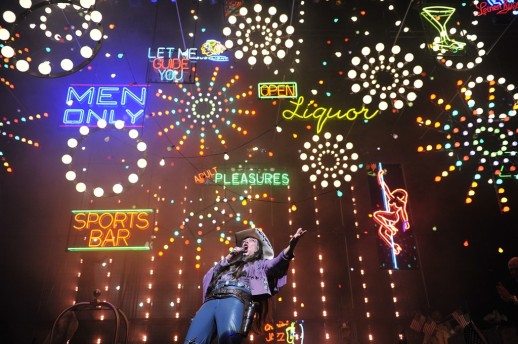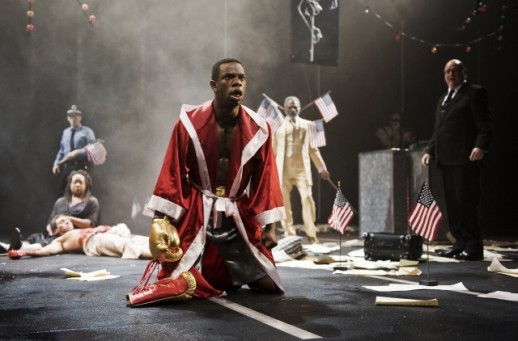

This was a fine, strong musical performance in mainstream big-house Handel style conducted by Harry Bicket. Vibrato of voices and instruments alike was modern and ringing. The odd aria was truncated to only an “A” statement, and presumably a few numbers were omitted. There was not a lot of recitative.
I would say the most completely successful vocal performance was Iestyn Davies as Eustazio. It’s a good sized voice, not really a glamorous sound, but even through the whole range, with clean, meaningful Italian diction. He’s appealing onstage, too: not just good-looking but alert in his own scenes and attentive to his colleagues. I’m ready to hear him in the big star parts, maybe even Rinaldo.
David Daniels has made a vocal transition in middle (or late middle) career. The singing has lost something that hypnotic repose he used to command; instead, he relies on a very solid technique. The effect is essentially the same, long-breathed phrases, shaped with meaning and beauty, but now you can hear the machinery working. He (still, that horrible word) looks great onstage, even hideously costumed as he was, and what little sense of serious drama emerged from the production was his creation.
It would be most interesting to hear Elza van den Heever in a production of this opera where Armida’s character of a conflicted sorceress would not be played for cheap gags. Her dramatic coloratura is cool and a bit smoky, but quite big, the largest voice on the stage.
Luca Pisaroni‘s Argante was a bit underwhelming, I thought, taking his lyric bass-baritone to its limits and tempting him to bluster. Of all the hideous costumes in this production, his was the worst, a skirt made of old bits of Persian carpet, a “Gaylord Ravenal” swallowtail coat and a feathered turban that would look fey on Maggie Smith.
Then there was Sonia Prina as Goffredo, rather an ugly voice but very defined coloratura, and Julia Kleiter, essentially a washout as Almirena, unfocused and wan.
If I have ever seen a worse opera staging than this one by Francisco Negrin, I must have repressed the memory. The sets and costumes were cheesy, looking like something from a kids’ TV show from the 1970s. Everything concerning Armida and Argante was camped up, up to and including the denouement when the pagans’ conversion to Christianity was turned into a joke. (Armida “accidentally” dropped the vessel of holy water on the last chord. Oopsy!) A clunky attempt at metahumor, lowering a gigantic harpsichord over the stage to symbolize Armida’s realm or something, was recycled from Negrin’s 2000 production of this opera at NYCO, vastly inflated and coarsened for the maximum of “who could take this nonsense seriously?” attitude.
And… can we please make an end once and for all of the corps de ballet cavorting during ritornellos? Particularly egregious was Armida’s gaggle of Harmonia Gardens demon-faggots wiggling their asses in bad imitation of the next-to-latest Beyoncé video. Over and over and over again, mind you, and even when they stood still they kept on mugging.
No, I’m not kidding. This piece of crap made Mary Zimmerman‘s worst opera work look like Wieland Wagner on a good day, and Zimmerman at least has the excuse she’s a neophyte at opera direction. Negrin’s been cranking out his brand of cutesy schlock for over two decades now, and my only hope is that that utter awfulness of this effort will turn unwary opera houses against him. Though, given the volume of belly laughs this Rinaldo won from the Lyric Opera audience, it seems that the crusade against bad taste may be unwinnable.
Meanwhile, a director who should be working at Lyric Opera, but isn’t (since the company is perhaps shaking in its boots at the prospect of John von Rhein rasping “Eurotrash! Eurotrash!”) made a successful and meaningful U.S. debut just a few blocks away at the Goodman Theater. Calixto Bieito‘s heavily revised version of Tennessee Williams‘ bizarre play Camino Real is not perfect, but it does treat the source material with respect and (more importantly) enormous love. The 110 minute single-act extravaganza is always fascinating to look at, endlessly surprising and even succeeds as entertainment. With a different audience (Friday night’s crowd was pretty listless) it might even win a lot of laughs amid the gasps.
Bieito’s take on this symbolist tale is not overtly political: a few American flags get waved around, but they’re more decorative than anything else. Yet there’s a thundering subterranean statement in the casting of the central character, archetypal “Yank” Kilroy. The actor in this part, Antwayn Hopper, is African-American, radiantly beautiful in face and physique, and unafraid to play the role as (in part) an Angry Black Man. He’s a walking symbol of the United States, but he’s not “Black American,” he is “American.” He is not minority, he is all of us.
This is a star-making performance, funny and touching and emotionally bold. Hopper doesn’t condescend or distance himself from the character’s naive sweetness; in fact, he seems to dare us to laugh at his honestly and openness. This dovetails handsomely with the action of the drama, in which the robbed and broke Kilroy is ritually humiliated by being forced to play a clown to earn a living. Hopper plays the second half of the show in a gold Speedo and smeared whiteface makeup, but amazingly he never loses his integrity or, on a very basic level, his dignity.
When the focus is off Hopper, the show loses some of its steam. I don’t think this is because Bieito isn’t as clear in his treatment of the “literary” characters. David Darlow‘s Casanova and Marilyn Dodd Frank‘s Marguerite each has one or two electrifying moments (he, penniless, is reduced to sucking up spilled cognac from the pavement) but they mostly fall just short of the edge of hysteria achieved so consistently by Mark L. Montgomery as Byron and especially André De Shields as Baron de Charlus.
This last performance is just astonishing, in what originally was a throwaway part. Bieito expands the character of the waspish, self-hating gay man to include an explicit sexual encounter only hinted at in Williams’ script, ending in an erotic asphyxiation gone wrong (or right, I guess, depending on just how self-hating.) And then the Baron returns in the second half of the play as a reanimated corpse to serenade the “fiesta” orgy with a ferocious performance of “I Put a Spell on You.”
Oddly, the apparently surefire role of the Gypsy fell flat, whereas the few lines here and there of the elderly whore Rosita were built into a spellbinding performance by Barbara E. Robertson.
And, as “The Dreamer,” a part invented for this production, Michael Medeiros played a version of the playwright himself, mashing together speeches for the omitted character of Don Quixote and a variety of Williams’ other writings. His brief epilogue manages to top Hopper’s death scene (rightfully) with a few simple but heartfelt lines about how the writer’s creative process is his (perhaps only) means of self-realization. Almost his last line is one of Williams’ most famous: “If you can’t be yourself, what’s the point of being at all?”
And then he swallows a handful of pills, and (not for the first time this evening) pukes violently. It’s Bieito’s genius, I think, that he can make us understand that even vomit can be a kind of poetry.
Photos: Dan Rest (Rinaldo), Liz Lauren (Camino Real)



























Comments